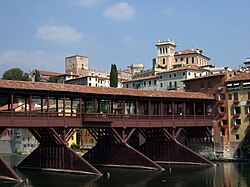Bassano del Grappa
| Bassano del Grappa | ||
|---|---|---|
| Comune | ||
| Città di Bassano del Grappa | ||

Ponte degli Alpini and Upper Castle.
|
||
|
||
| Location of Bassano del Grappa in Italy | ||
| Coordinates: 45°46′N 11°44′E / 45.767°N 11.733°ECoordinates: 45°46′N 11°44′E / 45.767°N 11.733°E | ||
| Country | Italy | |
| Region | Veneto | |
| Province / Metropolitan city | Vicenza (VI) | |
| Frazioni | Rubbio. Contrade: Campese, Marchesane, San Michele, Sant'Eusebio, Valrovina | |
| Government | ||
| • Mayor | Riccardo Poletto | |
| Area | ||
| • Total | 46 km2 (18 sq mi) | |
| Elevation | 129 m (423 ft) | |
| Population (31 December 2008) | ||
| • Total | 42,947 | |
| • Density | 930/km2 (2,400/sq mi) | |
| Demonym(s) | Bassanesi | |
| Time zone | CET (UTC+1) | |
| • Summer (DST) | CEST (UTC+2) | |
| Postal code | 36061 | |
| Dialing code | 0424 | |
| Patron saint | St. Bassianus | |
| Saint day | 19 January | |
| Website | Official website | |
Bassano del Grappa (Venetian: Basan /baˈsaŋ/ (plain form) or Bassan/Bassàn (italianized form)) is a city and comune, in the Vicenza province, in the region Veneto, in northern Italy. It bounds the communes of Cassola, Marostica, Solagna, Pove del Grappa, Romano d'Ezzelino, Campolongo sul Brenta, Conco, Rosà, Cartigliano and Nove. Some neighbourhoods of these communes have become in practice a part of the urban area of Bassano, so that the population of the whole urban area is higher than the population of Bassano proper.
The artist Jacopo Bassano was born, worked, and died in Bassano and took it as his surname. Bassano Del Grappa is also famous for inventing the spirit Grappa, traditionally an after-dinner drink made from pomace (discarded grape seeds, stalks, and stems).
The city was founded in the 2nd century BC by a Roman called Bassianus, whence the name, as an agricultural estate. However, an ancient bronze sword (called "spada di Riccardo"), found in 2009 and dating back to the 7th century BC, possibly between the 18th and 15th century BC, suggests that the area of Bassano was already inhabited not just in the pre-Roman period, but possibly even in the pre-Venetic period.
The first news of the existence of the medieval city dates from 998, while the Castle is mentioned first in 1150. In 1175 Bassano was conquered by Vicenza, but the city maintained a semi-autonomous status as a free comune in the 13th century also, when it was home to the family of the Ezzelini, who first unified the various territories of Veneto.
...
Wikipedia


